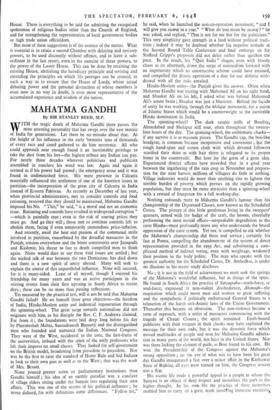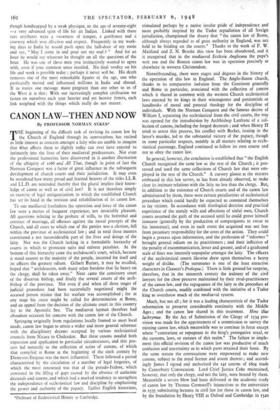MAHATMA GANDHI
By SIR STANLEY REED, M.P.
WITH the tragic death of ,Mahatma Gandhi there passes the most arresting personality that has swept over the-vast mosaic of India for generations. Let there be no mistake about that. At the height of his influence in the early 'twenties tens of thousands of every race and creed gathered to do him reverence. All who could approach near enough found it an inestimable privilege to take the dust from his feet—the highest tribute any Indian can pay. For nearly three decades wherever politicians and publicists assembled in conclave his word was law. Again and again it seemed as if his power had passed ; the emergency arose and it was found in undiminished force. His mere presence in Calcutta materially influenced the settlement of one of the knottiest issues in partition—the incorporation of the great city of Calcutta in India instead of Eastern Pakistan. As recently as December of last year, when provincial administrators, met to consider controls and food rationing, resolved that they should be maintained, Mahatma Gandhi imposed his No. "This," he said, "is a moral and not an economic issue. Rationing and controls have resulted in widespread corruption " —which is painfully true ; even at the risk of soaring prices they must go. And go they will ; those met to continue controls left to abolish them, facing if even temporarily tremendous price-inflation.
And recently, amid the heat and passion of the communal strife involved in partition, exacerbated by the dreadful massacres in the Punjab, tension everywhere and the bitter controversy over Junagadh and Kashmir, his threat to fast to death compelled men to think again. None would dare to say these vital issues are settled ; but the wicked talk of war between the two Dominions has died down and there is a new spirit of amity abroad. Many will seek to explain the source of this unparalleled influence. None will succeed, for it is many-sided. Least of all myself, though I enjoyed his friendship for many years and was an active participant in the stirring events from their first uprising in South Africa to recent days ; these can be no more than passing reflections.
Yet measured by the practical test, will it not be said that Mahatma Gandhi failed? He set himself three great objectives—the freedom of India, Hindu-Moslem unity and industrial regeneration through the spinning-wheel. The great surge towards nationalism did not originate with him, as his disciple the Rev. C. F. Andrews claimed. Far from it ; the foundations were laid deep long before his day by Pherozeshah Mehta, Surendranath Bannerji and the distinguished men who founded and nurtured the Indian National Congress. They were of the West, occidental to the core, the first-fruits of the universities, imbued with the spirit of the early professors who left their impress on small classes. They looked for self-government on the British model, broadening from precedent to precedent. Nor was he the first to raise the standard of Home Rule and bid Indians to look to their own past as well as to the West ; that was the work of Mrs. Besant.
None poured greater scorn on parliamentary institutions than Gandhi himself ; his idea of an earthly paradise was a conclave of village elders sitting under the banyan tree regulating their own affairs. This was one of the secrets of his political influence ; he never defined, for with definitions come differences. " Follow me,"
he said, when he launched the non-co-operation movement, " and I will give you swaraj in a year." " What do you mean by swami?" he was asked, and replied, "That is not for me but for the politicians." This very simplicity gave strength in a land without political tradi- tions ; indeed it may be doubted whether his negative attitude at the Second Round Table Conference and final embargo on Sir Stafford Cripps's proposals did not delay rather than quicken the pace. In the result, his " Quit India " slogan, even with bloody chaos as its aftermath, drove the surge of nationalism forward with an impetuosity which, no constructive scheme could have attained, and compelled the drastic operation of a date for our definite with- drawal with all the risks entailed.
Hindu-Moslem unity—the Punjab gives the answer. Often when Mahatma Gandhi was touring with Mahomed Ali on his right hand, and Shaukat All on his left, I asked what was behind Mahomed Ali's astute brain ; Shaukat was just a blusterer. Behind the facade of unity he was working, through the khilafat movement, for a union of Islamic States which would be a counterweight to the inevitable Hindu domination in India.
The spinning-wheel? The dark satanic mills of Bombay, Ahmedabad and Sholipur still roar, often throughout the twenty- four hours of the day. The spinning-wheel, the emblematic charka- if any survive it is as museum pieces. The Gandhi cap, the box-like headgear, is common because inexpensive and convenient ; tiut the rough hand-spun and woven cloth with which devoted followers scarified their skins as with hair shirts is relegated to its proper home in the countryside. But here lay the germ of a great idea. Experienced district officers have recorded that in a good year between the ingathering of the rain crop in November and prepara- tion for the next harvest millions of villagers do little or nothing. Village industries would do more than anything else to lighten the terrible burden of poverty which presses on the rapidly growing population, but they must be more attractive than a spinning-wheel with a reward of fourpence for a full working-day.
Nothing redounds more to Mahatma Gandhi's honour than his championship of the Depressed Classes, now known as the Scheduled Castes. The picture of this little gentleman living in the sweepers' quarters, armed with the badge of the craft, the broom, cheerfully performing the most menial offices—unspeakable degradation to the caste Hindu—must profoundly move any who understands the brutal oppression of the caste system. Yet one is compelled to ask whether the Mahatma's championship did them real service ; certainly his fast at Poona, compelling the abandonment of the system of direct representation provided in the 1935 Act, and substituting a com- plicated method of indirect voting, even with weightage, weakened their position in the body politic. The man who speaks with the greatest authority for the Scheduled Castes, Dr. Ambedkar, is under no illusions as his recent study discloses.
No ; it is not in the field of achievement we must seek the springs of the Mahatma's wonderful influence, but in things of the spirit. He found in South Africa the practice of Satyagraha—truth-force, or soul-force, expressed in non-violent disobedience, Ahimsah—the inspiration which could move men and women to great suffering and the sympathetic if politically embarrassed General Smuts to a relaxation of the harsh anti-Asiatic laws of the Union Government. Thereafter this became an obsession. The non-violence became a term of reproach, with a series of massacres commencing with the tragedy of Chauri Chaura ; the spirit remained. Earth-bound publicists with their tongues in their cheeks may have exploited the message for their own ends, but it was the dynamic force which moved multitudes of people and won for Mahatma Gandhi admira- tion in many parts of the world, riot least in the United States. Nor was there lacking the element of guile, as Bose found to his cost. He won the Presidentship of the Congress against the Mahatma's strong opposition ; on the eve of what was to have been his great day Gandhi inaugurated a fast over a minor affair in the Kathiawar State of RajkOte, all eyes were turned on him, the Congress session was a flop.
His ascetic life made a powerful appeal to a people to whom the Sunyasi is an object of deep respect and austerities the path to the higher thought. In his own life the practice of these austerities enabled him to carry on a great work involfing immense exertions,
though handicapped by a weak physique, to the age of seventy-eight —a very advanced span of life for an Indian. Linked with these rare attributes were a sweetness of temper, a gentleness and a courtesy which won affection and respect. Frequently in my work- ing days in India he would push open the half-door of my room and say, "May I come in and pour out my soul ? " And for an hour he would say whatever he thought on all the questions of the hour. He was one of those men you instinctively wanted to agree with, even if your common sense recoiled. No final verdict on his life and work is possible tcday ; perhaps it never will be. His death removes one of the most remarkable figures of the age, one who profoundly moved and influenced millions in India and abroad. If he leaves one message more pregnant than any other to us of the West it is this : With our increasingly complex civilisation we fasten on ourselves each year heavier and yet heavier fetters, each link weighted with the things which really do not matter.































 Previous page
Previous page